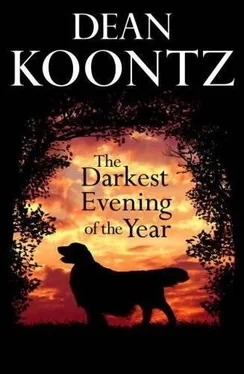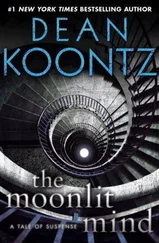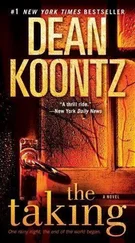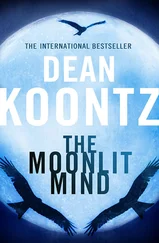The incendiary material would produce temperatures as high as 42,000 degrees Fahrenheit, which was less than half as hot as the surface of the sun, not hot at all compared to the eighteen million degrees at the core of the sun. Nevertheless, it would be hot enough and sustained long enough virtually to vaporize everything in the Rover and to reduce the vehicle itself to molten steel from which the make, model, and owner could never be identified.
Of Georgie Jobbs, nothing whatsoever would remain, not even a bone fragment, nothing except Billy’s fond memories of him.
On the next street, the night brightened. The first flames broke through the garage roof. They were white with blue edges.
Billy drove out of that neighborhood. The situation there would shortly be untenable.
When Amy Redwing went missing or subsequently turned up dead, nothing in her house would remain to connect her to her previous life; consequently, the authorities would have no reason to suspect Billy’s boss of her murder.
Vernon Lesley, who had searched Redwing’s house, was dead, and the man whom he had hired for backup, Bobby Onions, was dead, and the man who cleaned out their offices of any possible reference to Redwing was also dead, and all those items from their offices would shortly be smoke and fumes and soot.
If the fire department failed to arrive quickly, houses flanking the Shumpeter residence would either be set afire by traveling flames or, possibly, would be ignited solely by the intense heat of the pyre next door.
In Billy’s experience, a truly thorough job usually required some collateral damage.
He drove toward Newport Beach. Although hungry, Billy could wait for dinner until he had done one more job here in Orange County and then had driven to Santa Barbara.
He and Gunther Schloss, who had shot Lesley and Onions, would have a late dinner together, whereafter Billy would kill him. When Gunny was dead, the next to the last connection between Redwing and Billy’s boss would have been erased.
The last connection was Billy. This fact had not been lost on him. He had given it much hard thought.
In Santa Barbara, he had booked a luxurious hotel suite in the name of Tyrone Slothrop, a pseudonym that he had not used previously, that he had been saving for a special occasion.
Billy liked extreme luxury and especially enjoyed over-the-top hotels that provided amenities so extravagant that Louis XVI and Marie Antoinette, given a chance to experience such establishments, would have been embarrassed by the comparative grubbiness of their life at the palace.
In Newport Beach, Billy parked around the corner from the building in which Brian McCarthy had both his offices and his apartment.
Millie and Barry Packard, who had agreed to keep Fred and Ethel for a night or two, lived in a shingle-sided New England-style house on a low rise above the beach.
The front door was unlocked, as Amy had been told it would be. She and Brian followed Fred, Ethel, and Nickie through the house to the back patio, where Millie sat at a teak table, sipping a martini, in the magical light of gas-flame hurricane lanterns with prismatic panes.
Five feet two, slender, with short shaggy blond hair and large eyes, Millie had an air of elfin glamour and looked as if she had just gotten home from playing the lead in a production of Peter Pan . She was fiftyish, perhaps too old for the role, though Mary Martin had probably still played the part in Broadway revivals at that age.
“Freddie darling, my adorable Ethel,” she exclaimed as the two kids went straight to her, tails lashing, confident of receiving ear rubs and chin scratches. “You’re as fabulous as ever, but why didn’t you fix your folks a drink before you brought them out here?”
“Don’t get up,” Amy said, bending to kiss Millie on the cheek.
“Cupcake, I never get up for family, only for people I don’t like, so I can mix them weak drinks that make them desperate to go elsewhere.”
They were family because they were both board members of Golden Heart and both besotted with goldens.
“Brian, dear, you know where to find the liquor cabinet. We’re out of cocktail olives, it’s a tragedy of historic proportions, but we’re coping because we’re Americans.”
After bending for a kiss of his own, Brian said, “We can’t stay more than a minute, Millie. We have to hit the road.”
“My God, you’re a handsome young man. It can’t be natural. You shouldn’t start cosmetic surgery so young. By the time you’re sixty, your mouth will be stretched ear to ear.”
Amy said, “Where’s Barry?”
“On the beach with the dogs. Just for a walk. No romping in the surf. It’s too late to be combing sand out of fur, and the dogs would need grooming, too.”
Fred and Ethel spotted the trio on the sand below. They hurried to the edge of the patio. As much as they wanted to plunge down the slope to the sea, they wouldn’t dash off without permission.
When Millie glimpsed Nickie, her eyes widened with delight. “Oh, Amy, you’re right. She’s a beauty. Come here, you fabulous creature. I’m your Aunt Millie. Nothing they’ve told you about me is true.”
While Nickie and Millie charmed each other, Amy watched Barry on the beach with Daisy and Mortimer.
Past play, the dogs weaved lazily along the strand, smelling one by one the shells, the driftwood, the knots of weed, the sea urchins, the ocean-smoothed medallions of bottle glass left by the last high tide and to be carried away on the next.
A million fragments of the shattered moon knocked together in the troughs and crests of a low surf, while in the lulls between sets of waves, the jigsaw self-assembled, repairing the silvery sphere, which shimmered in the currents, twisted, and came apart once more.
The rhythms of the sea, the quarter-million-mile light of the moon, and the companionship of dogs inspired a sense of timelessness, of peace, of the profound grace always waiting to be discovered when the noise of daily life subsides.
Amy had the uneasy feeling that this tranquil moment might be the last that she would know for a long time, if not forever.
Perhaps having seen them on the patio, Barry Packard came up from the sea, his dogs preceding him.
Of the Packards’ many fine qualities, Amy admired none more than the compassion they revealed in their choice of dogs. They adopted only goldens with special needs, which were the hardest to place in forever homes.
As a puppy only a few weeks old, Mortimer had been found in a Dumpster, thrown away because he had spina bifida and was paralyzed from the waist down. Although treated like garbage, he had been fortunate-considering that he might have been drowned in a bucket before being tossed in the trash.
After examinations by three different vets, Mortimer was judged too severely disabled to be saved. Euthanasia was recommended.
In his expressive face, in his sweet and cheerful demeanor, Amy had seen not an inconvenience but instead a soul as bright as any.
At the start, Mortimer could walk on his front legs but only drag his rear. Surgery to remove his hopelessly deformed left hind leg, followed by weeks of therapy, resulted in an accomplished tripod pup who could not only walk without dragging his butt but also run with a gait that was as peculiar as it was swift.
Five years old now, Mortimer was a certified therapy dog. Millie took him to children’s hospitals to visit ill and disabled kids who, every one, were inspired by his courage and good cheer.
Daisy was blind. She navigated by sound and smell and instinct, but also by staying close to Mortimer, who was her trusted guide and boon companion.
Steps led up the ice-plant-covered slope, and three-legged Morty and blind Daisy ascended with the enthusiasm of any goldens at the realization that visitors had come calling.
Читать дальше
Конец ознакомительного отрывка
Купить книгу










